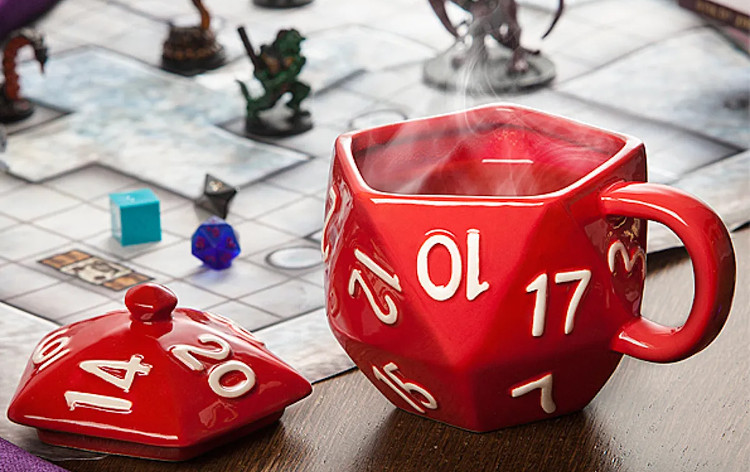A few weeks ago, in Behind The Screens – It’s O.K. To Relax, I said “common advice says to only call on rolls when the results matter. For me, that would come at a huge cost.” Today, I’ll be expanding on that cost.
Rolling Instead Of Assuming Success
Just like my philosophy for handling players is that different players play the game in different ways and for different reasons, my opinion of conventional GMing wisdom is that there is no conventional GM. No matter how often you hear a piece of advice, if it doesn’t feel right for you or doesn’t work at your table, ignore it. It’s not that the advice is wrong, or that you’re GMing wrong, it’s just not the right fit for how you GM.
One piece of advice I see often that I absolutely discard is the idea that we shouldn’t have our players roll certain checks. The G.I. JOE Roleplaying Game Core Rulebook even has this to say on the matter:
In the G.I. JOE Roleplaying Game, GMs are encouraged only to call for Skill Tests when they will have a meaningful effect on the story – rolling is fun, it can also bog down and interrupt good storytelling.
I go in the opposite direction. Again, not because I believe the advice is wrong, but it’s wrong for me. Here’s why.
Rolling Is Storytelling
The classic storytelling advice is to show, not tell. In film, that means expressing the idea through on screen action. In comics, that means easing up on the words to let the art speak for itself. And in tabletop roleplaying, I believe that the best way to show how good (or bad) a character is at a certain task is to roll for it.
When I have a PC succeed at a task without a roll (and I have, my fellow GMs, even if I don’t agree that it should ever be the default), they succeed averagely. Were I to describe them barely succeeding at a routine roll, even if that is a more interesting description, I’d expect objections based on what my choice says about their character. Similarly, if I describe an amazing accomplishment without a roll, I’d expect confusion. Why did I make such a big deal about their success at a routine task? It’s like when you read a comic and the letterer bolded a random word in a dialogue bubble. I don’t know about you, but I usually try to figure out why that word earned emphasis, and it takes me out of the story.
Conversely, if I have the players roll a DIF 5 Skill Test and they roll a 6, then the flavour I add to my description of them nearly flubbing a task they didn’t think twice about adds to the moment. The low roll sets a storytelling expectation and my description delivers on it.
For The Wins
On Star Trek: The Next Generation, Worf is the strongest, toughest crew member. He’s head of security, after all! That’s why he loses more fights than anyone on the Enterprise.
Instead of showing us Worf regularly winning fights to reinforce his reputation, he’s used to show how strong a threat is. Beating up Worf is the TNG equivalent of killing a redshirt on the original series.
If we only call on rolls when there’s a significant chance of failure, my fellow GMs, then our PCs’ success rates will be 50/50 for the abilities they’re supposed to be good at. Sure, if you count all of the gimmes as wins, they average closer to 75/25 or 90/10. I don’t count those. Removing dice from a task detaches the sense of ownership from the success, and therefore the best a player can feel about their primary skills is par. I don’t want my players to only succeed half the time at their primary abilities, I want them to see how awesome the character they built at their best abilities. More successful checks, even easy ones, reinforce that feeling.
Rolling Is More Than Just Fun
Rolling dice is both tactile and visceral, and one of the best ways to engage your players regardless of the impact the roll has on the story. There’s the anticipation that this roll might be more meaningful than it appears, the ego of getting to add a big number to a roll and potentially wow the table, or the fear that a low total might highlight a character’s flaws.
Using Adventurous when it ran on 1e as an example, we’ve talks about Loren scoring in the 40s on Lily’s inconsequential baking rolls more than we’ve talked about the result of any other roll. Why? Because it’s an impressive result, sure, and the context made it funnier and more memorable. But also, because baking is what Lily does, and getting in the 40s on a baking check highlights something only that character can do.
Speaking of Adventurous, you may remember exchanges in the early episodes where Crystal tells me I “don’t have to roll” and I’ve already rolled. Not only do I think of checks as an opportunity to roll rather than something I have to do, calling on checks regardless of the difficulty sets a rhythm to how I play. The idea of what I want to try to rolling to see how I do is one uninterrupted moment. I’ve seen it argued that calling on rolls slows a game down, but if your players are like me, rolling checks whenever you want to accomplish a task is part of the cadence of the game. It’s a habit that speeds up my gameplay overall.
Player/Character/Sheet Relations
I’m fond of Perram’s saying that “Players don’t start playing an RPG when they sit down at the table, they start playing when they build their first character.” When a player adds an option to their character sheet, it’s their way of telling the game what they want to be good at. And getting to roll these options brings the character in their head alive at the table.
But characters have more abilities than just the big choices players make. Choices have cascading benefits, so being good in one area could unintentionally make them talented in other areas. For example, for 2e Lily to be good at baking, she could train in Crafting. Which means Lily’s ability to layer a cake also makes her understand how to rebuild a clockwork engine.
Speaking of baking, players also choose abilities for half-baked tertiary aspects of their character. Along the same lines, some builds give players more options than the player needs and they end up taking abilities that seemed neat at the time. They risk forgetting all of these types of options.
When we call for a roll, it means our players’ eyes go for their character sheet. The more they need to roll, the better they learn where to find what information, and the more likely they remember abilities they have beyond their core concept.
Me Time
Speaking of players’ eyes on their character sheet, like I said in It’s O.K. To Relax, there’s no better opportunity to gather my thoughts than during a die roll. Everyone is invested in the roll, meaning getting our players to pick up their dice gives us a rare moment where no one wants our attention as the GM. Whether we need time to digest what came before, plan what’s still to come, or just not think for a second, the best time to be alone with ours thoughts is when the players watch a die rolling.
Bringing It All Together
The total of all of the above is greater than the sum of its parts. When my players roll, the results show me what they’re good at. I don’t ask my players for their character sheets and I don’t have notes about their stats because I’ll never remember what’s on their sheets ahead of time, and looking their stats up during play derails my momentum. But if I ask for a roll and I experience a lower or higher result than I expected, that’s how I learn who my characters are and what they can do. It also shows me what my players get excited about. And it gives me time to process all of that, and everything else I need to track as a Game Master.
Dice rolls are as important to me and how I tell the story of our campaign as original art depicting a character is to other GMs. Rolls and results always meaningfully affect my story, even if its just a moment of characterization. They don’t bog down or interrupt my storytelling, they define it.
Every two weeks, Ryan Costello uses his experience as a Game Master, infused with popular culture references, to share his thoughts on best GMing practices to help his fellow GMs. Often deconstructing conventional wisdom and oft repeated GMing advice, he reminds his fellow GMs that different players play the game in different ways, and for different reasons.





